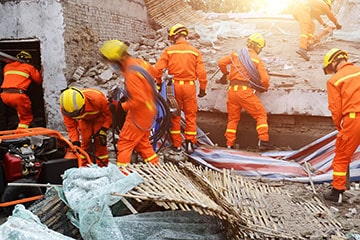Forensics

Forensic scientists collect and evaluate trace evidence. It’s their job to analyze weapons, fingerprints and bodily fluids, and perform tests on other evidence.
Computer forensics and forensic psychology are two related professions that also help solve crime and bring people to justice.
Forensics is a popular field because of TV shows like CSI, and you can do it too if you have the drive … and the right education.
Local Law Enforcement

There’s more to law enforcement than flashing lights. Law enforcement personnel includes cops and police detectives as well as sheriffs and state patrol. There are roles to consider in every branch of law enforcement, but the right education may be paramount to working in the field you want.
Federal Law Enforcement

Federal law enforcement is vital to the security and safety of our country. Agencies like the FBI, CIA, Homeland Security, and more employ special agents to help enforce federal and interstate rule of law and keep Americans safe around the globe.
Contributing to the security of our country can be a satisfying objective as you build a career. Find out what education can help you achieve your goal.
The Courts (Paralegal)

Once the accused are apprehended, they have the right to their day in court, and our legal system ensures that everyone gets a fair trial. Even if you don’t want to become a lawyer, there are plenty of other roles in law firms, corporations, and government, such as legal secretary, paralegal, court reporter, and more.
Paralegals perform many of the same tasks as lawyers. In fact, behind every great lawyer, there are smart, hard-working paralegals.
Read about some of the supporting roles within the legal community, and pursue the education you need to help the litigation process go smoothly, negotiate settlements, and bring criminals to justice.
Cybersecurity

Digital data is constantly being generated and shared at high speed, and there is a critical need to secure it. To protect data, organizations require skilled and highly-knowledgeable professionals who can secure computer networks and company information.
Many local and federal law enforcement agencies are looking for technically-trained cybersecurity professionals to help them uncover and stop the perpetrators of digital crimes.
Emergency Management

While emergency managers spend most of their time planning and preparing in case of different emergencies, these are the professionals who jump into action when tragedy occurs. An emergency management degree at any level can help you succeed in this critical role.
Corrections

With over 749,000 workers providing for the needs of almost seven million clients (inmates, parolees and probationers), the correctional system goes well beyond prison walls. Corrections (including jails, prisons, parole, probation and community-based programs) is an important part of any society, and perhaps more so in the United States than in other countries.
Learn what education may help you find your place within in the American correctional system.
Advice From Real Criminal Justice Professionals
Our criminal justice contributors bring real-world experiences and authoritative research to every page served.

Cody W. Telep
Associate Professor and Associate Director
School of Criminology and Criminal Justice, Arizona State University

Stephen Webb
Principal Lecturer and Criminal Justice Lead
Government & Criminal Justice, Regent University

Vesna Markovic
Chair and Associate Professor of Justice
Law and Public Safety Studies, Lewis University





